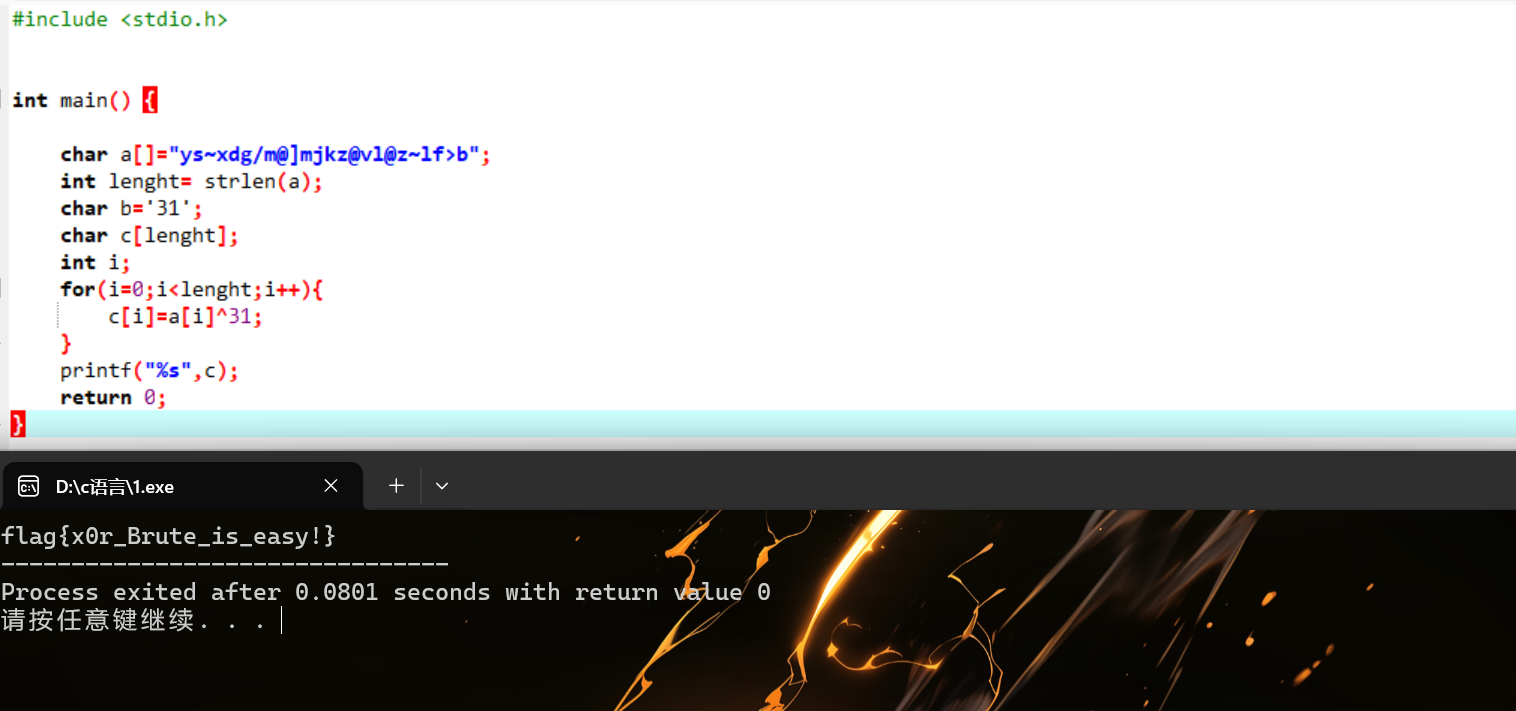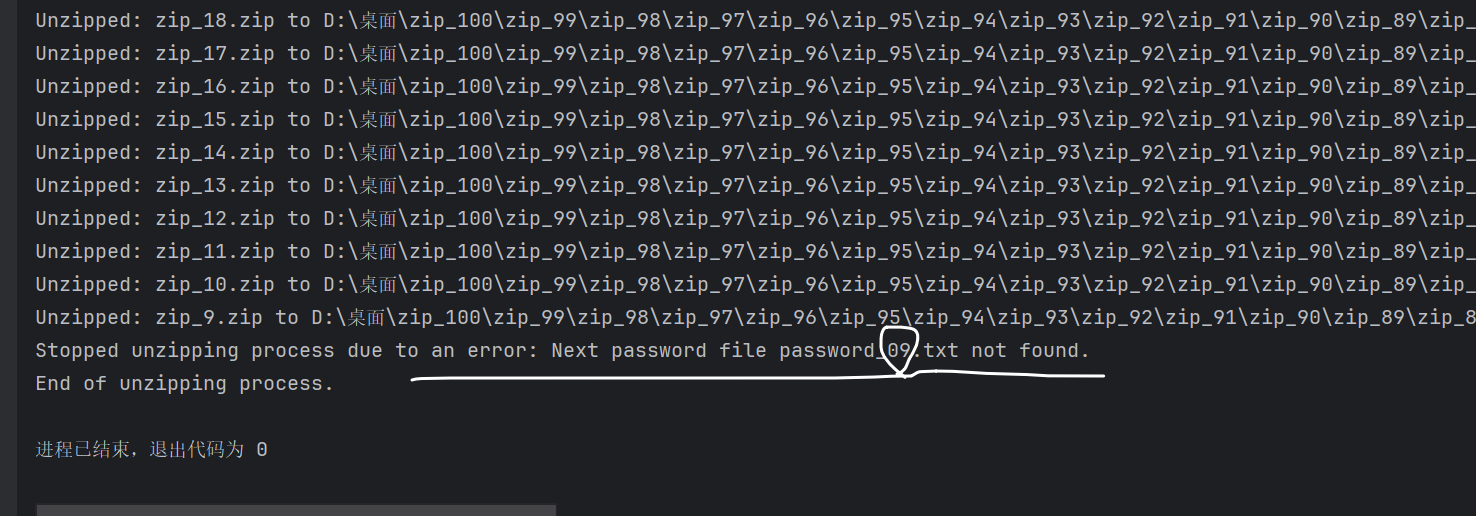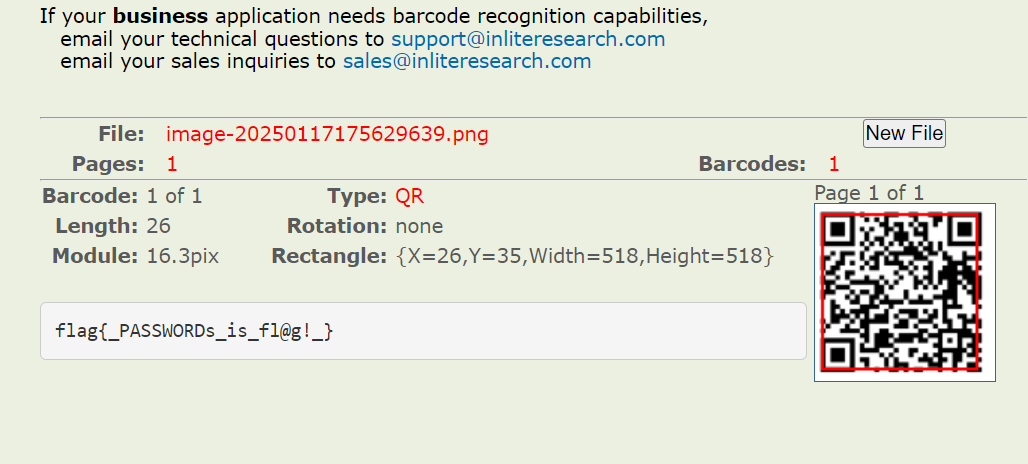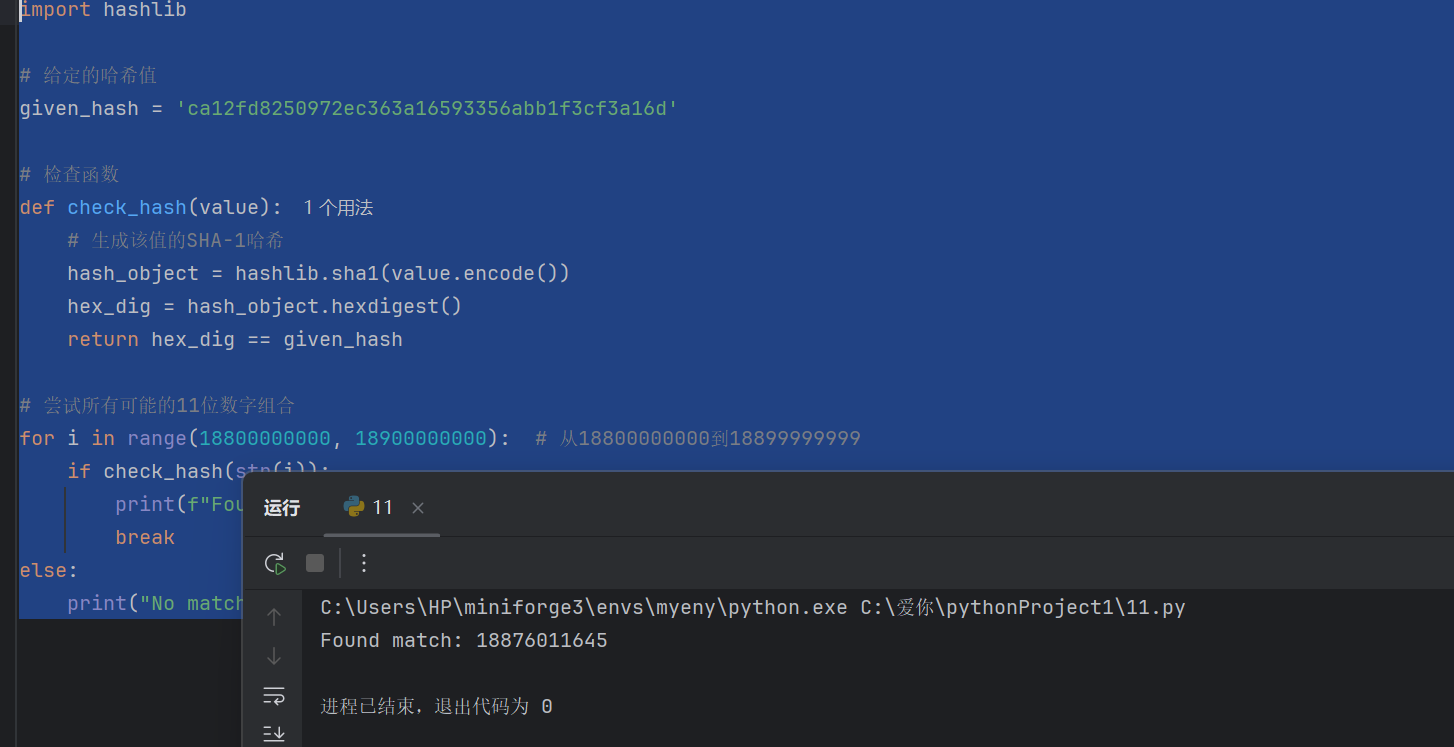春秋杯(2025)
msic 简单算术 1.打开附件看到
1 ys~xdg/m@]mjkz@vl@z~lf>b
2.根据题目意思
一般的flag结尾都是},先让b和}异或
1 2 3 4 5 6 7 8 9 10 11 #include <stdio.h> int main() { char a='b'; char b='}'; char c; c=a^b; printf("%d",c); return 0; }
得到31
3.再用31依次和字符串异或
1 2 3 4 5 6 7 8 9 10 11 12 13 14 15 16 #include <stdio.h> int main() { char a[]="ys~xdg/m@]mjkz@vl@z~lf>b"; int lenght= strlen(a); char b='31'; char c[lenght]; int i; for(i=0;i<lenght;i++){ c[i]=a[i]^31; } printf("%s",c); return 0; }
1 flag{x0r_Brute_is_easy!}
压力大,写个脚本吧 1.发现是一个百层压缩
1 2 3 4 5 6 7 8 9 10 11 12 13 14 15 16 17 18 19 20 21 22 23 24 25 26 27 28 29 30 31 32 33 34 35 36 37 38 39 40 41 42 43 44 45 46 47 48 49 50 51 52 53 54 55 56 57 58 59 60 61 62 63 64 65 66 67 68 69 70 71 72 73 74 75 76 77 78 79 80 81 82 83 84 85 86 87 88 89 90 91 92 93 94 95 96 import zipfile import os import base64 import re def read_password_from_file(file_path): """从给定路径的文件中读取Base64编码的密码并解码""" try: with open(file_path, 'r') as file: encoded_password = file.read().strip() password = base64.b64decode(encoded_password).decode('utf-8') return password except Exception as e: print(f"Error reading password from {file_path}: {e}") raise def un_zip(path, file_name, password): """解压ZIP文件到指定路径,并提供密码""" current_file = os.path.join(path, file_name) try: with zipfile.ZipFile(current_file) as zip_file: # 获取第一个非隐藏文件的名字作为新的目录名 for new_file in zip_file.namelist(): if not (new_file.startswith('__MACOSX') or new_file.endswith('/')): break # 创建一个以解压出来的压缩包为名字的新文件夹 new_path = os.path.join(path, os.path.splitext(file_name)[0]) os.makedirs(new_path, exist_ok=True) # 解压所有内容到新路径,并提供密码 zip_file.extractall(path=new_path, pwd=password.encode()) return new_path, new_file except RuntimeError as e: print(f"RuntimeError: {e}") raise except Exception as e: print(f"An error occurred while unzipping {file_name}: {e}") raise def find_next_password_file(base_path, last_number): """ 根据上次使用的密码文件数字,在解压后的文件夹中查找下一个密码文件。 """ next_number = last_number - 1 next_password_filename = f"password_{next_number:02}.txt" next_password_file_path = os.path.join(base_path, next_password_filename) if os.path.exists(next_password_file_path): return next_password_file_path else: raise FileNotFoundError(f"Next password file {next_password_filename} not found.") # 解压缩所需的参数 base_path = r"D:\桌面\zip_100" initial_file_to_unzip = "zip_99.zip" initial_password_file = os.path.join(base_path, "password_99.txt") # 开始解压过程 current_path = base_path file_to_unzip = initial_file_to_unzip last_password_number = 99 while True: try: # 读取当前密码 password = read_password_from_file(initial_password_file) # 解压当前ZIP文件 current_path, new_file = un_zip(current_path, file_to_unzip, password) print(f"Unzipped: {new_file} to {current_path}") # 检查是否还有zip文件需要解压 if new_file.lower().endswith('.zip'): # 更新要解压的文件路径 file_to_unzip = new_file # 查找下一个密码文件 next_password_file = find_next_password_file(current_path, last_password_number) last_password_number -= 1 initial_password_file = next_password_file else: break except Exception as e: print(f"Stopped unzipping process due to an error: {e}") break print("End of unzipping process.")
3.发现问题改进下脚本
1 2 3 4 5 6 7 8 9 10 11 12 13 14 15 16 17 18 19 20 21 22 23 24 25 26 27 28 29 30 31 32 33 34 35 36 37 38 39 40 41 42 43 44 45 46 47 48 49 50 51 52 53 54 55 56 57 58 59 60 61 62 63 64 65 66 67 68 69 70 71 72 73 74 75 76 77 78 79 80 81 82 83 84 85 86 87 88 89 90 91 import zipfile import os import base64 def read_password_from_file(file_path): """从给定路径的文件中读取Base64编码的密码并解码""" try: with open(file_path, 'r') as file: encoded_password = file.read().strip() password = base64.b64decode(encoded_password).decode('utf-8') return password except Exception as e: print(f"Error reading password from {file_path}: {e}") raise def un_zip(path, file_name, password): """解压ZIP文件到指定路径,并提供密码""" current_file = os.path.join(path, file_name) try: with zipfile.ZipFile(current_file) as zip_file: # 创建一个以解压出来的压缩包为名字的新文件夹 new_path = os.path.join(path, os.path.splitext(file_name)[0]) os.makedirs(new_path, exist_ok=True) # 解压所有内容到新路径,并提供密码 zip_file.extractall(path=new_path, pwd=password.encode()) return new_path, zip_file.namelist() # 返回解压的所有文件列表 except RuntimeError as e: print(f"RuntimeError: {e}") raise except Exception as e: print(f"An error occurred while unzipping {file_name}: {e}") raise def find_next_password_file(base_path, last_number): """ 根据上次使用的密码文件数字,在解压后的文件夹中查找下一个密码文件。 支持一位数和两位数的文件名。 """ next_number = last_number - 1 for format_str in ['%d', '%02d']: # 尝试两种格式 next_password_filename = f"password_{format_str % next_number}.txt" next_password_file_path = os.path.join(base_path, next_password_filename) if os.path.exists(next_password_file_path): return next_password_file_path raise FileNotFoundError(f"Next password file not found for number {next_number}.") # 解压缩所需的参数 base_path = r"D:\桌面\zip_100" initial_file_to_unzip = "zip_99.zip" initial_password_file = os.path.join(base_path, "password_99.txt") # 开始解压过程 current_path = base_path file_to_unzip = initial_file_to_unzip last_password_number = 99 while True: try: # 读取当前密码 password = read_password_from_file(initial_password_file) # 解压当前ZIP文件 current_path, extracted_files = un_zip(current_path, file_to_unzip, password) print(f"Unzipped: {file_to_unzip} to {current_path}") # 检查是否还有zip文件需要解压 zip_files = [f for f in extracted_files if f.lower().endswith('.zip')] if zip_files: # 更新要解压的文件路径 file_to_unzip = zip_files[0] # 假设只有一个ZIP文件被解压出来 # 查找下一个密码文件 next_password_file = find_next_password_file(current_path, last_password_number) last_password_number -= 1 initial_password_file = next_password_file else: break except Exception as e: print(f"Stopped unzipping process due to an error: {e}") break print("End of unzipping process.")
完成解压
3.打开最后一个文件
4.可以看到密码加密码和png可以想到把base64都拼在一起可能会得到一个png的图片,拼接后:
5.得到一个二维码:
在线扫描二维码
1 flag{_PASSWORDs_is_fl@g!_}
通往哈希的旅程 1.有题目已知前三位是188,而且是11位
用脚本爆破:
1 2 3 4 5 6 7 8 9 10 11 12 13 14 15 16 17 18 19 import hashlib # 给定的哈希值 given_hash = 'ca12fd8250972ec363a16593356abb1f3cf3a16d' # 检查函数 def check_hash(value): # 生成该值的SHA-1哈希 hash_object = hashlib.sha1(value.encode()) hex_dig = hash_object.hexdigest() return hex_dig == given_hash # 尝试所有可能的11位数字组合 for i in range(18800000000, 18900000000): # 从18800000000到18899999999 if check_hash(str(i)): print(f"Found match: {i}") break else: print("No match found")








